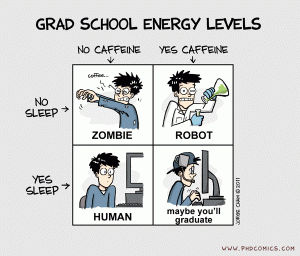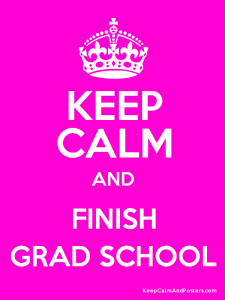Disclaimer: Technically, I have not yet ‘survived’ grad school. But, with three out of five years under my belt, I like to think I’ve acquired some useful wisdom. Although there is no one-size-fits-all model for successfully navigating grad school, here I’ll outline some strategies that I find particularly effective for maximizing efficiency and maintaining solid work-life balance. Stay organized (and give your brain a break)
Although I pride myself on having strong memory skills, grad school very quickly humbled me—I learned that I could no longer rely solely on my brain as a weekly planner. Between classes, lab hours, and meetings (more meetings, and even more meetings), your daily and weekly schedules fill up amazingly quickly, and you are bound to forget about something eventually. After recurring nightmares about forgetting to show up for class my first year, I knew it was time to recruit some external help. Using some sort of calendar and/or planner is critical for keeping track of your daily schedule, as well as different upcoming assignments and deadlines. I personally have found it useful to use an online calendar (e.g., through Gmail) to keep track of where I need to be when, and to use a separate organizational tool to keep track of what I need to do. Websites and apps like Asana and Wunderlist allow you to create lists of current and future tasks and deadlines, and you can create automated mobile/online reminders for yourself as due dates approach. I generally prefer a traditional pen-and-paper weekly ‘to do’ list that I hang in front of me at my desk, if only to experience the satisfaction of physically crossing items off the list as they get done.
Some other miscellaneous organizational tips:
-when writing papers or lit reviews, keep track of all your references with an online program—it will save you incredible amounts of time when you have to build a references list or if you end up needing to switch the reference format (e.g., from APA to AMA). For free options, try Zotero or Mendeley; for paid options, Endnote.
-create separate & specific folders on your computer for every class, project etc. so that you aren’t wasting time searching through your downloads folder to find that article you saved 6 months ago
-you’re allowed to put completed tasks on a to-do list just to check them off and feel productive
Set deadlines—and share them
As you spend less time in classes and more time doing independent tasks and research, you encounter fewer and fewer ‘hard’ deadlines. The absence of concrete due dates makes it increasingly easy to put off certain work, assuring yourself “I’ll get to that when I’m less busy next week”. Here’s a secret: next week will be just as busy. And so will the one after that. When I first discovered my own tendency to continually push aside work that was not bound by a specific end date, I tried to set deadlines for myself. I’d create a list of all my tasks for the week and specify my target completion date. Although this strategy sounded solid in theory, I became a pro at convincing myself of necessary extensions of said deadlines. I’ve since found that an effective solution is to capitalize on my own fears of negative evaluation from others by sharing my deadlines. By telling my advisor, for example, that I’ll have a paper draft to her by Tuesday morning, I increase my own accountability for completing the task in a timely manner. This can also be a useful approach when doing collaborative work with peers—creating shared deadlines increases the likelihood of following through with the work. It’s much easier to justify a missed deadline to yourself than to others.
Capitalize on small pockets of time
You’d be surprised how much you can get done in 20 minutes. Although I appreciate days when I can set aside a 3-hour window to focus on a specific task (e.g., writing a paper, coding data), time can be both a luxury and a curse. When it comes to tasks that involve writing, for example, sometimes I catch myself being just as productive (if not more) when I work within a shorter time interval and perceive my available time to be limited. Especially when I get ‘stuck’ or lose sight of the big picture with my writing, working in small bursts is a useful way to quickly get my main ideas on paper (even if they aren’t the most gracefully written). Even if you only have enough time to write three sentences, these little accomplishments add up quickly over time. You can also take advantage of the 15 minutes between meetings, for example, to knock a few easy tasks off your to-do list (e.g., responding to emails, proofreading your PIA blog post). I’ve realized that I’m much less stressed out during the day when I take on these ‘little things’ as they come, rather then letting them pile up over the course of a day.
Take care of yourself
Sleep is an amazing thing. We’ve heard about the importance of sleep from teachers, parents, and even researchers for years, and I’m here to tell you that they are right. In the same way that setting concrete deadlines makes me more accountable for getting work done on time, treating my nightly hours of necessary sleep as largely non-negotiable helps me be more diligent during the day. I learned from a very early age that I am my worst self when I don’t get adequate zzzs. While lack of sleep no longer ends with me sitting on the street curb bawling and refusing to walk home from school (sorry, Mom), it now manifests as a lack of focus and minimal energy to do work. In that sense, the few extra hours of work I might gain from staying up late would be undone by my limited productivity the following day.
Another good way to stay healthy both physically and mentally is by doing some sort of physical activity. Even if it means setting aside just 20 minutes each day to walk around the neighborhood, I’ve found that merely getting up, moving around, and focusing on something other than work can go a long way. If you have trouble motivating yourself to workout after a long day, try exercising first thing in the morning. If you dread the idea of camping out on a treadmill for half an hour at 7 am, sign up for a group class or rec league team which operate under a concrete schedule and incorporate more social elements—you want physical activity to be something that feels like a enjoyable break, rather than yet another chore to check off your to-do list. Building physical activity into your schedule as a routine, rather than as an ‘as time allows’ activity, will also increase the likelihood that you stick with it, even if/when work piles up (after all, this is precisely when you’ll benefit from it the most!).
Give yourself a break
As I’ve mentioned in a previous post, in grad school you quickly learn that the work is never ‘done’. Figuring out how to strike a healthy balance between work and your non-academic life is a major (and oftentimes difficult) task of graduate school. Especially in programs that extend for several years, it’s important to supplement the intensive work week(end) with other experiences that keep you feeling happy and sane (e.g., spending time with friends, going to a movie, playing sports), especially to avoid feelings of burnout early on. Starting graduate school doesn’t have to mean putting a pause on everything else that’s an important part of your life–it’s all about finding a happy medium. Personally, I try to build in at least one non-academic activity per day that I can look forward to. Whether it’s watching an episode of The Bachelor with friends, cooking something new for dinner, or playing in a softball game, knowing that I have something relaxing or fun ahead of me helps me stay motivated and on task during my working hours. When I then resume my writing/reading/coding/data analysis after taking a break for something social and/or non-school related, I feel all the more energized to get back to work.
Know thyself
In the end, finding ways to make it through graduate school as a happy, healthy, and productive student is really about getting to know yourself. Some of this is trial and error—discovering the strategies that don’t work for you can sometimes be the most important learning experiences. Are you more efficient working at school or from home? Do you work better in the mornings or evenings? Can you successfully multitask doing data analyses while listening to your reality TV podcast (the answer is probably no)? Taking time early on in grad school to explore these different preferences helped me identify the conditions under which I thrive the most.

